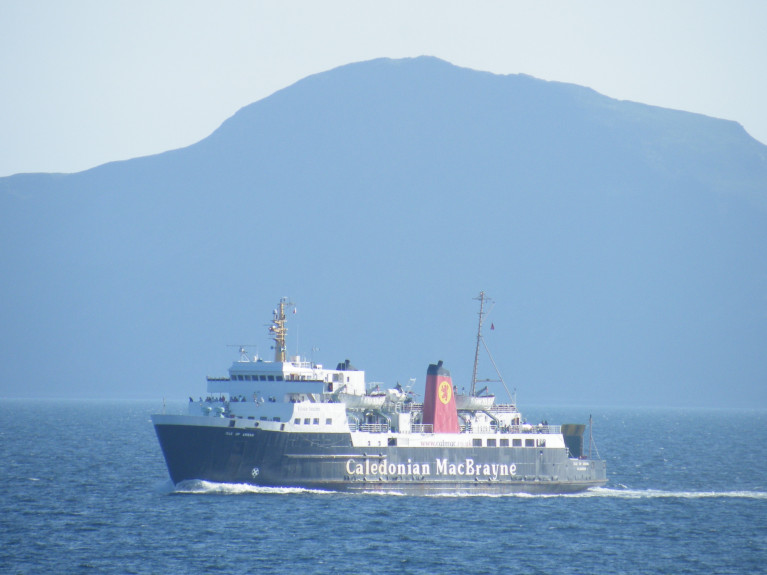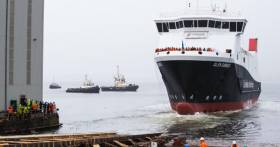Displaying items by tag: Isle of Arran
Stranded Ferry Passengers Left on Scottish Isle After Cancellations
Passengers taking a ferry have been stranded on the Isle of Arran, Scotland, after bad weather caused service disruption and cancellations.
Gusts of up to 60mph, reported STV News, have affected the safe delivery of CalMac sevices from Brodick to Ardrossan over the weekend.
The operator managed to clear “around half” of cars booked to leave Arran by using a service from Lochranza to Tarbert on Sunday.
However, disruption has continued and more cancellations have taken place on Monday.
Robert Morrison, director of operations at CalMac, said: “There has been severe weather related disruption since the New Year with gusts of up to 60mph impacting on our ability to deliver services to Arran and elsewhere.
More on the story here.
A Scottish ferry master with decades of experience sailing on the west coast has hit out at the management of the lifeline service and the “inadequacy” of current quayside infrastructure.
As pressure mounts on the islands according to The Herald, for action to improve the performance and reliability of Scotland’s vital ferry network, a senior captain has marked his retirement with a savage attack on operator CalMac and the failings of harbour infrastructure policy presided over by CMAL (Caledonian Maritime Assets).
The mariner underlined the difficulties which the under-pressure service is causing for island communities, claiming that any local looking to book a vehicle space on a ferry must do so six months in advance.
As previously featured on Afloat Arran businesses vented their fury over a ‘flawed’ harbour move
The claims come after a recent series of reports in The Herald exposed deep-seated problems on the ferry network, which islanders and exports say are the cause of an ageing fleet, insufficient capacity and a lack of vessel flexibility.
For more on criticism over the new harbour at Brodick on the Isle of Arran click here.
#FerryNews - A pair of ferries being built on the Clyde, Scotland for the publicly owned operator CalMac in a £100 million deal have been hit by new delays, the Scottish Government has confirmed.
As The National reports, the roll-on roll-off car and passenger vessels for the Clyde and Hebrides network are being built at Ferguson Marine Engineering at Port Glasgow.
The MV Glen Sannox, launched last year, was initially due to be delivered in May but was pushed back to this winter. Its completion date is now June 2019 and it is due to enter service on the Ardrossan-Arran (see new terminal) route around two months later, after sea trials.
For further reading on the delays to the newbuilds, click here.
#Aran&Arran – A passenger freightship that served the Aran Islands notably from Galway and a present day car ferry running to Arran, Scotland have similarities, writes Jehan Ashmore.
The custom-built Oileáin Árann (see photo) completed in 1991 at James Miller of St. Monans, on the Firth of Fife, served the Galway-Aran Islands route. The 416 gross tonnage vessel became the last ship to offer a 'direct passenger route' to and from the mid-west city, previously run by CIE’s Naomh Éanna.
Operator, O’Brien Shipping as previously reported sold the almost 40m long Oileáin Árann in 2006 to Icelandic owners Samskip. They converted the small ship to emerge as the ro-ro ferry Sæfari that trades in coastal waters to islands in northern Iceland.
As for the current car ferry operating to Arran, on the Firth of Clyde, the also custom-built Isle of Arran was too built in Scotland but on Clydeside at Ferguson Ailsa Ltd, Port Glasgow. The 3,296 gross tonnage relief ferry operates Ardrossan-Brodick (Arran: see Scotland in miniature) during the summer months. In addition Caledonian Isles operates year round for Caledonian MacBrayne (CalMac).
Towards the end of last month, the almost 85m Isle of Arran resumed seasonal Ardrossan-Campbeltown sailings on the Mull of Kintyre. This is the second year since the most southernmost CalMac route was given permanent status following a three year pilot trial. This was to develop traffic and boost tourism to the isolated peninsula a mere 11 nautical miles from Northern Ireland.
Likewise of the former Oileáin Árann, the CalMac pair feature twin funnels and have their names in Scots Gealic. Isle of Aran is translated to Eilean Arainn and as for Caledonian Isles this is Eileanan Chaledonia. The English names are displayed on the hull, while the bi-lingual versions are to seen on the superstructure.
Both these car ferries are to be replaced when the first of a pair of 102m dual-fuel (diesel and LPG) ferries are planned for year-round service for Arran and the Uig Triangle. Construction of the €97m newbuilds is taking place in Port Glasgow at the Ferguson Marine Engineering Limited’s (FMEL) shipyard. The design of these sleek looking newbuilds will again feature twin funnels.
The first newbuild is expected to enter service in early 2018, with the sister following a few months later. Each ferry will carry 127 cars or 16 HGVs or a combination of both and up to 1,000 passengers.































































